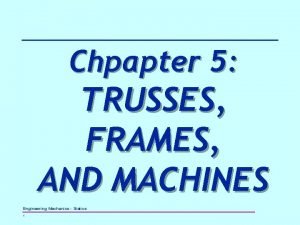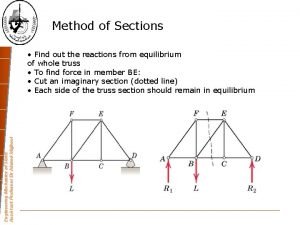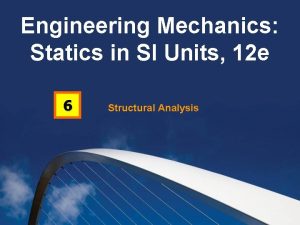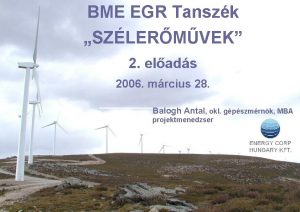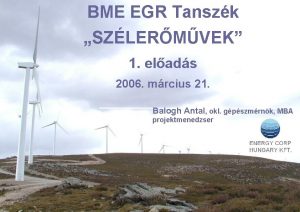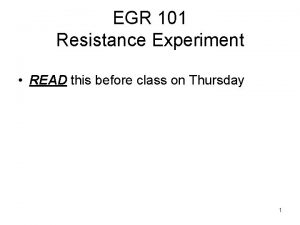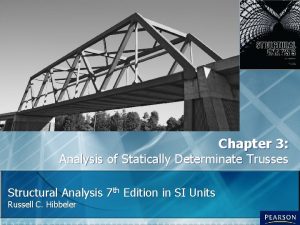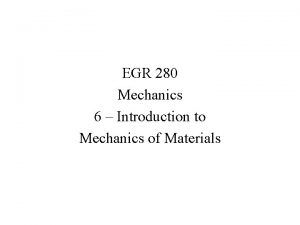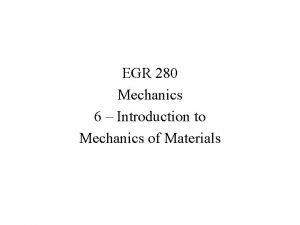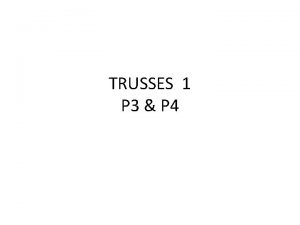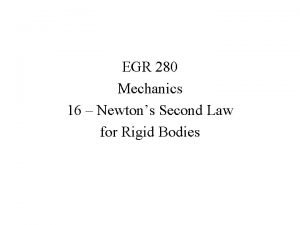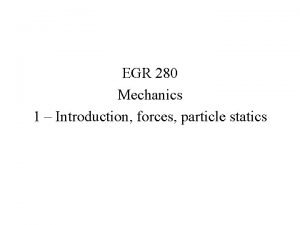EGR 280 Mechanics 4 Analysis of Structures Trusses









- Slides: 9

EGR 280 Mechanics 4 – Analysis of Structures Trusses

ANALYSIS OF STRUCTURES • No new theory! • Only new names and techniques.

TRUSS Graphics and problem statements © 2004 R. C. Hibbeler. Published by Pearson Education, Inc. , Upper Saddle River, NJ. • • Major engineering structure class Composed entirely of straight, two-force members pinned at their endpoints Loading takes place only at the joints, never between Simple trusses are composed of basic triangular shapes

Analysis of trusses by the Method of Joints, used to find the force in each and every member of the truss. Example: Determine the force in each member of the truss shown below: Graphics and problem statements © 2004 R. C. Hibbeler. Published by Pearson Education, Inc. , Upper Saddle River, NJ. Procedure: • • • Draw a FBD of the entire truss and determine the support reactions Draw a FBD of each joint and write equations for the unknown member forces. Solve the joint equations, report if each member is in tension or compression

Step 1: Determine the reaction forces on the entire truss: 400 N B ∑Fx = Cx + 600 N = 0 ∑Fy = Ay + Cy – 400 N = 0 ∑MC = (400 N)(3 m) – Ay (6 m) + (600 N)(4 m) = 0 Cx = 600 N ← Cy = 200 N ↓ Ay = 600 N ↑ A Cy C Cx D Ay 600 N

Step 2: Draw a FBD of each joint, assume all members in tension, write and solve the joint equilibrium equations FAB ∑Fx = FAD + (3/5)FAB = 0 ∑Fy = 600 N + (4/5)FAB = 0 A FAD 600 N 400 N B ∑Fx = FBC + (3/5)FBD - (3/5)FAB = 0 ∑Fy = -400 N - (4/5)FAB - (4/5)FBD = 0 FBC FAB FBD 200 N FBC C ∑Fx = -FBC – 600 N = 0 ∑Fy = -200 N - FCD = 0 600 N FCD FBD FAD FCD D 600 N ∑Fx = -FAD - (3/5)FBD + 600 N = 0 ∑Fy = FCD + (4/5)FBD = 0

Solution: • • • FAB = 750 N (C) FAD = 450 N (T) FBC = 600 N (C) FBD = 250 N (T) FCD = 200 N (C) Graphics and problem statements © 2004 R. C. Hibbeler. Published by Pearson Education, Inc. , Upper Saddle River, NJ.

Analysis of trusses by the Method of Sections, used to find the force in only a few members of the truss. Example: Determine the forces in members GE, GC and BC of the truss shown Graphics and problem statements © 2004 R. C. Hibbeler. Published by Pearson Education, Inc. , Upper Saddle River, NJ. Procedure: • After finding the overall reactions, “cut”, or section, the truss through the members where the forces are to be found • Draw the FBD of that part of the truss which has the fewest unknowns • Write equilibrium equations to solve for the unknown forces EXERCISE: Find the reactions Ax and Ay

G FGE FCG A 400 N 300 N B FBC ∑Fx = FGE + (4/5)FCG + FBC – 400 N = 0 ∑Fy = 300 N – (3/5)FCG = 0 ∑MG = FBC(3 m) – (400 N)(3 m) – (300 N)(4 m) = 0 FGE = 800 N (C) FGC = 500 N (T) FBC = 800 N (T)

